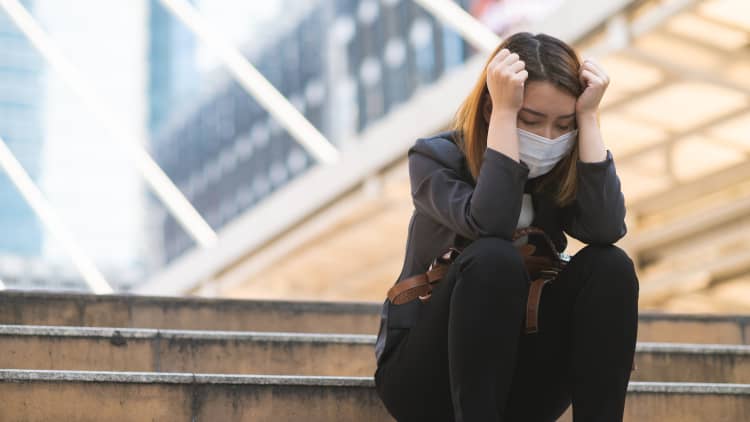On Friday, the world learned that President Donald Trump has contracted Covid-19, just two days after his advisor Hope Hicks tested positive. Trump and Hicks traveled together this week on Air Force One, including to and from the presidential debate in Cleveland on Tuesday.
The turn of events reinforces the idea that spending time indoors with others in close proximity can be risky. So as the weather turns and people spend more time indoors, what you can do to lower your risk of contracting Covid-19?
In addition to continuing to socially distance and wear a mask, buying a portable home air purifier is a popular choice right now, and for good reason.
The virus that causes Covid-19 is mainly spread through respiratory droplets that are expelled when an infected person talks, coughs, sneezes or breathes, and are inhaled by another person. But the virus can also be spread through smaller airborne particles that have been "aerosolized" and linger in the air for minutes or hours.
"I believe pretty confidently that there is some element [of airborne transmission]," White House advisor Dr. Anthony Fauci said Wednesday.
Using a portable air purifier can reduce the airborne viruses and germs in your home and other indoor spaces. While furnace filters and HVAC systems have built-in filters, these portable devices add a layer of air cleaning to individual rooms.
Simply running an air purifier isn't enough to protect you from the Covid-19. Here's what you need to know about air purifiers and the pandemic:
How air purifiers work
Air purifiers filter out airborne contaminants and clean the air in an indoor space, Shelly Miller, professor of mechanical engineering at the University of Colorado Boulder who studies urban air pollution, tells CNBC Make It. (Many people in the scientific community prefer the term "air cleaner," because they clean the air, not "purify" it, she adds.)
These devices typically consist of a filter and a fan: The air purifier pulls air in, passes it through a filter that removes small airborne particles and then dumps clean air back in the room, she says.
Outside of the pandemic, air purifiers can be useful during wildfires, because they reduce the smoke inside your house, Miller says. They can also remove common indoor allergens in the air, such as dust and animal dander. And air cleaners can even come in handy if you're cooking in a small apartment, because they reduce cooking emissions, she adds.
Do air purifiers protect you from Covid-19?
According to the Centers for Disease Control, poorly ventilated spaces increase the risk of Covid-19 transmission, because the virus can linger in the air and be inhaled by others.
Air purifiers can be a helpful tool to use in homes and confined indoor spaces because they increase air circulation, which introduces fresh air into a space while removing potentially contaminated air.
But portable air purifiers alone can't prevent Covid-19 transmission.
Air purifiers with HEPA, or "high-efficiency particulate air" filters are the best option for consumers, because they can capture at least 99.97% of airborne particles that are at least 0.3 microns in size, Miller says. However the Covid-19 virus is about 125 nanometers or 0.125 microns large, so it is technically smaller than what consumer purifiers would capture. But experts say that when the virus is encapsulated in a respiratory droplet, a HEPA filter may be able to trap and remove the particles.
Air purifiers, however, do not replace the need to wear a face mask, maintain social distance and practice hand hygiene.
What to look for when buying an air purifier
There are lots of air purifiers on the market, many including extra bells and whistles beyond just filtration, Miller says. Look for an air purifier that uses a HEPA filter, and consider the size of the room that you intend to use it for, she says. A device's "clean air delivery rate" (or CADR) will tell you how big of a room it can clean at the highest setting, according to the Environmental Protection Agency. Miller suggests opting for air cleaners that have been vetted by the American Home Appliance Manufacturers.
Not sure what model to pick? The Coway Airmega AP-1512HH ($250) is a solid pick because it includes four layers of filtration, including a HEPA filter, and works in rooms up to 361 square feet. For a more budget-friendly option that's ideal for smaller rooms up to 185 square feet, consider the $139 Blueair Pure 411+.
Other ways to boost air flow in your home
Beyond using a portable air cleaner, Miller says that opening your windows is a great way to let outside air in and dilute the indoor air. "If it's a very still day outside and if you're not getting a lot of airflow, I recommend taking a small fan and blowing the air from indoors outside," she says.
And if you don't want to spend hundreds of dollars on an air purifier, you can attach a HEPA filter to a regular box fan to create a DIY air cleaner, she adds. (Square HEPA filters for box fans can be purchased at most hardware stores and online retailers such as Amazon.)
Check out: Americans spend over $5,000 a year on groceries—save hundreds at supermarkets with these cards
Don't miss:



